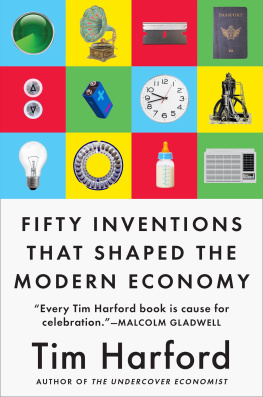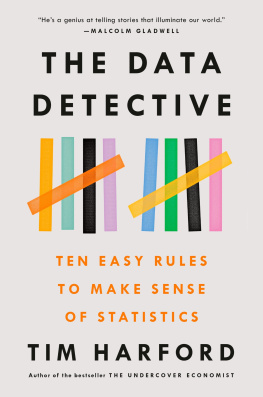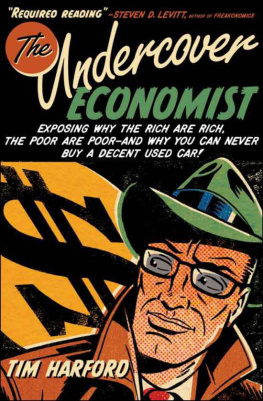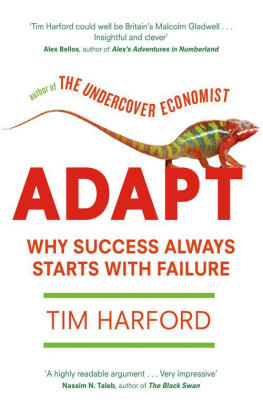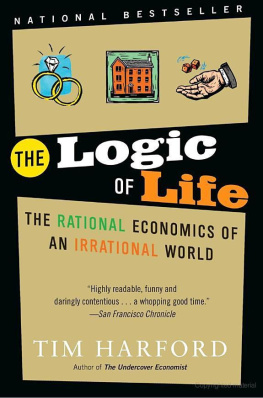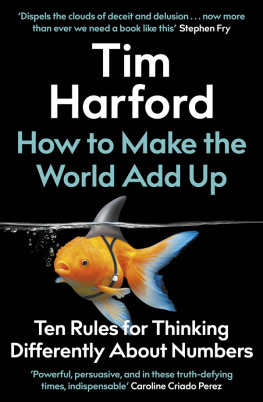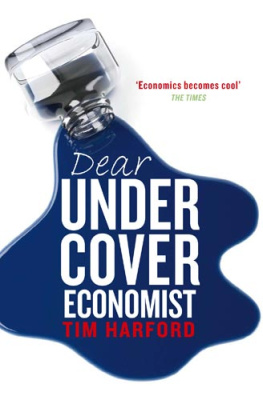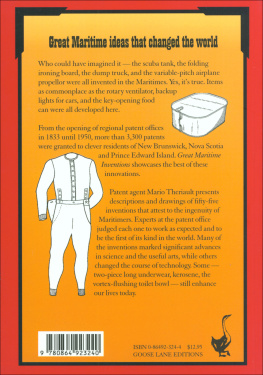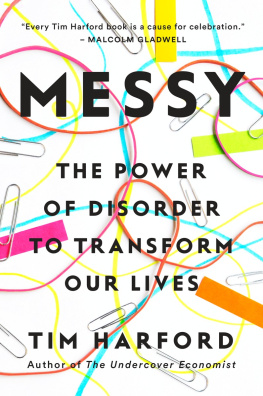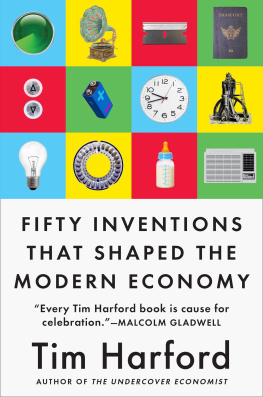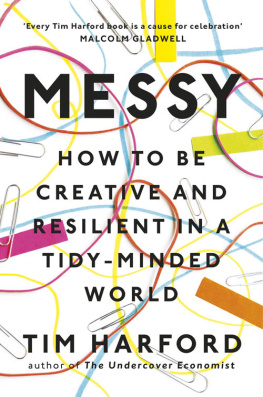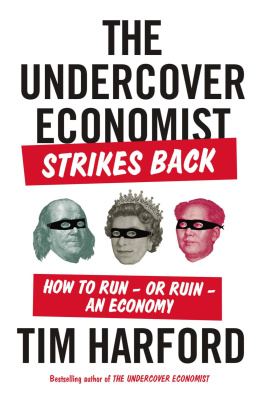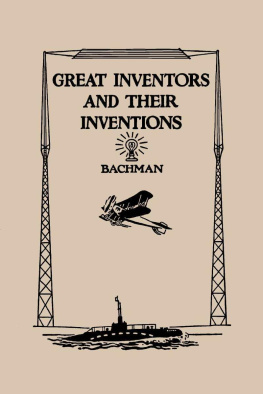Penguin supports copyright. Copyright fuels creativity, encourages diverse voices, promotes free speech, and creates a vibrant culture. Thank you for buying an authorized edition of this book and for complying with copyright laws by not reproducing, scanning, or distributing any part of it in any form without permission. You are supporting writers and allowing Penguin to continue to publish books for every reader.
Names: Harford, Tim, author.
Title: Fifty inventions that shaped the modern economy / Tim Harford.
Description: New York : Riverhead Books, 2017. | Includes index. | Identifiers: LCCN 2017013776 (print) | LCCN 2017023702 (ebook) | ISBN 9780735216150 (ebook) | ISBN 9780735216136 (hardcover)
Subjects: LCSH: InventionsEconomic aspectsHistory. | Technological innovationsEconomic aspectsHistory. | Economic history.
p. cm.
While the author has made every effort to provide accurate Internet addresses at the time of publication, neither the publisher nor the author assumes any responsibility for errors, or for changes that occur after publication. Further, the publisher does not have any control over and does not assume any responsibility for author or third-party websites or their content.
1.
The Plow
I magine catastrophe.
The end of civilization. This complex, intricate modern world of ours is finished. Dont worry about why. Maybe it was swine flu or nuclear war, killer robots or the zombie apocalypse. And now imagine that youlucky youare one of the few survivors. You have no phone. Whom would you phone, anyway? No Internet. No electricity. No fuel.
Four decades ago, the science historian James Burke posed that scenario in his TV series Connections. And he asked a simple question: Surrounded by the wreckage of modernity, without access to the lifeblood of modern technology, where do you start again? What do you need to keep yourselfand the embers of civilizationalive?
And his answer was a simple yet transformative technology. Its a plow. And thats appropriate, because it was the plow that kick-started civilization in the first place. The plow, ultimately, made our modern economy possible. And by doing that, it made modern life possible, too, with all its conveniences and frustrations: the satisfaction of good, plentiful food; the ease of a quick Web search; the blessing of clean, safe water; the fun of a video game; but also the pollution of air and water, the scheming of fraudsters, and the grind of a tedious jobor no job at all.
Twelve thousand years ago, humans were almost entirely nomadic, hunting and foraging their way into every niche they could find all around the world. But at the time the world was emerging from a cold snap: things were starting to get hotter and drier. People who had been hunting and foraging in the hills and high plains found that the plants and the animals around them were dying. Animals were migrating to the river valleys in search of water, and people followed.
These fertile but geographically limited river valleys changed the way people got enough to eat: it was less rewarding to roam around foraging for food, but more rewarding to give the local plants some encouragement. That meant breaking up the surface of the soil, which brought nutrients to the surface and let moisture seep deeper, out of sight of the harsh sun. At first they used sharp sticks, held in the hand, but soon they switched to a simple scratching plow, pulled by a pair of cows. It worked remarkably well.
Agriculture began in earnest. It was no longer just a desperate alternative to the dying nomadic lifestyle, but a source of real prosperity. When farming was well establishedtwo thousand years ago in Imperial Rome, nine hundred years ago in Song dynasty Chinathese farmers were five or six times more productive than the foragers they had replaced.
Think about that: It becomes possible for a fifth of a societys population to grow enough food to feed everyone. What do the other four-fifths do? Well, theyre freed up to specialize in other things: baking bread, firing bricks, felling trees, building houses, mining ore, smelting metals, constructing roadsmaking cities; building civilization.
But theres a paradox: More abundance can lead to more competition. If ordinary people live at subsistence levels, powerful people cant really take much away from themnot if they want to come back and take more the next time theres a harvest. But the more ordinary people are able to produce, the more powerful people can confiscate. Agricultural abundance creates rulers and ruled, masters and servants, and inequality of wealth unheard of in hunter-gatherer societies. It enables the rise of kings and soldiers, bureaucrats and prieststo organize wisely, or live idly off the work of others. Early farming societies could be astonishingly unequalthe Roman Empire, for example, seems to have been close to the biological limits of inequality: if the rich had had any more of the Empires resources, most people would simply have starved.
But the plow did more than create the underpinning of civilization, with all its benefits and inequities. Different types of plows led to different types of civilization.
The first simple scratch plows used in the Middle East worked very well for thousands of yearsand spread west to the Mediterranean, where they were ideal tools for cultivating the dry, gravelly soils. But then a very different tool, the moldboard plow, was developedfirst in China more than two thousand years ago, and much later in Europe. The moldboard plow cuts a long, thick ribbon of soil and turns it upside down. In dry ground, thats a counterproductive exercise, squandering precious moisture. But in the fertile wet clays of Northern Europe, the moldboard plow was vastly superior, improving drainage and killing deep-rooted weeds, turning them from competition into compost.
The development of the moldboard plow turned Europes natural endowment of fertile land on its head. People who lived in Northern Europe had long endured difficult farming conditions, but now it was the north, not the south, that enjoyed the best and most productive land. Starting about a thousand years ago, thanks to this new plow-based prosperity, cities of Northern Europe emerged and started to flourish. And they flourished with a different social structure from that of cities around the Mediterranean. The dry-soil scratch plow needed only two animals to pull it, and it worked best with a crisscross plowing in simple, square fields. All this had made farming an individualistic practice: a farmer could live alone with his plow, oxen, and land. But the wet-clay moldboard plow required a team of eight oxenor, better, horsesand who had that sort of wealth? It was most efficient in long, thin strips often a step or two away from someone elses long, thin strips. As a result, farming became more of a community practice: people had to share the plow and draft animals and resolve disagreements. They gathered together in villages. The moldboard plow helped usher in the manorial system in Northern Europe.

